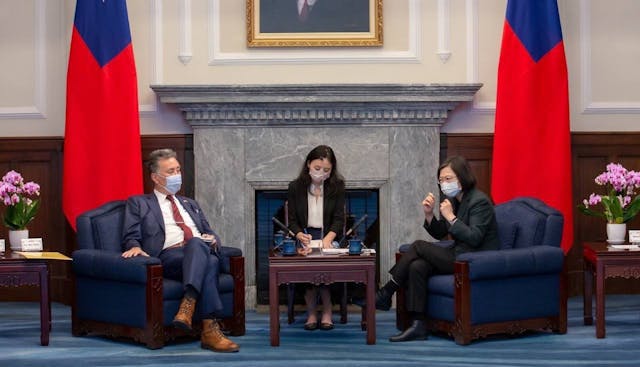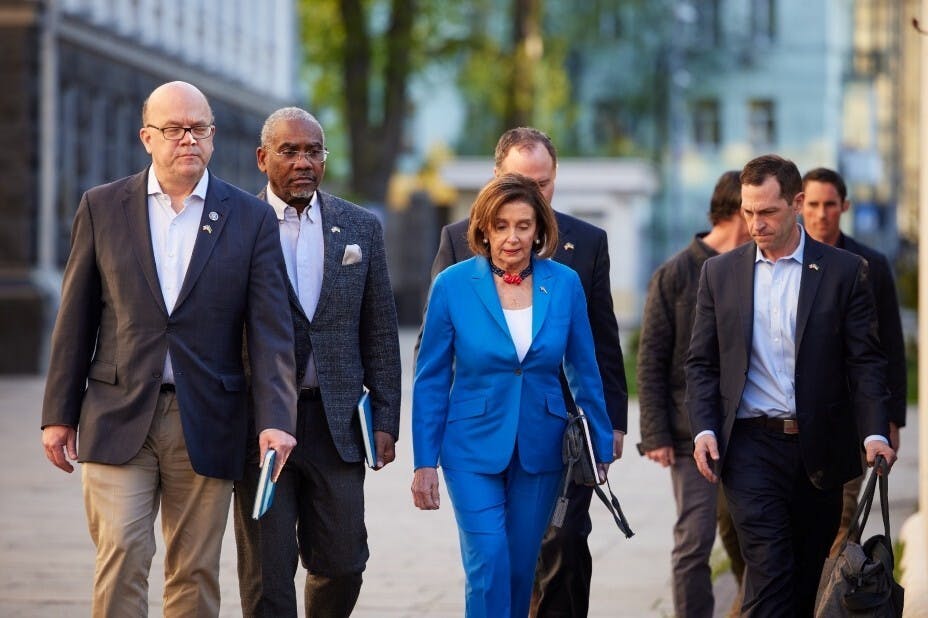如果美國前國務卿基辛格曾警告拜登政府應該關注美中共同的戰略利益,而不是讓美國的對華政策在很大程度上受美國國內政治的左右,那麼美國眾議院議長佩洛西「暫定」訪問台灣的潛在危機,從基辛格的現實政治角度來看便必須化解。
佩洛西本來計劃在今年4月訪問台灣,但由於她感染了新冠病毒,此行被押後。7月29日,佩洛西開始計劃訪問亞洲,包括新加坡、馬來西亞、南韓和日本。
習近平明言 玩火必自焚
中國大陸的官員,從外交部到國防部,都表示強烈反對佩洛西「暫定」訪問台灣,強調中國主權不容侵犯。
最重要的是,在美國總統拜登與中國國家主席習近平長逾兩個小時的電話談話中,習近平強調,美方不應在台灣問題上「玩火」,中方「絶不為任何形式的台獨勢力留下任何空間」。
「空間」這個關鍵詞不僅指政治方面,也包括外交方面,這意味着美國任何試圖正式或半正式承認台灣現有民進黨政權的行為,都無異於嚴重違反「一個中國」的原則。
可以這樣說,作為眾議院議長,佩洛西試圖在民進黨政權統治下訪問台灣是不明智、不恰當和危險的舉動。與1997年4月的中美關係相比,當時比現在和諧得多。佩洛西「暫定」訪台,與當年共和黨的眾議院議長金里奇 (Newt Gingrich)訪問由李登輝執政的國民黨統治下的台灣不同,佩洛西此次「暫定」訪台時機不當,自然被中方視為公然挑釁。
1997年4月,江澤民領導下的中國逐漸崛起,但一直等到1997年7月才恢復對香港的主權,然後是1999年11月恢復對澳門行使主權。現在是2022年,在香港和澳門回歸中國政治軌道後,北京正在進一步計劃中華民族的偉大復興,下一步的目標是統一台灣。
佩洛西曾在人權和民主問題上批評過中國。她計劃的台灣之行,似乎源於她自己的意識形態考慮。無論如何,如果要避免中美突然劍拔弩強,民主黨可以令她懸崖勒馬。 雖然美國軍方和安全官員已經建議她不要進行這樣的訪問,但美國軍方也有打算在佩洛西堅持這樣做時保護她。
佩洛西訪台 日內見分曉
挑戰是假設性的。如果佩洛西訪問台灣,她的飛機會被允許降落在台灣土地上嗎?中國方面的強硬派人士表示,她的飛機可能無法降落在台灣,中國大陸的戰機甚至可能飛越台灣的天空,以宣示中國大陸對台灣的主權──如果發生這樣的情況,就算沒有觸發軍事衝突,也會有引發意外的危險。台灣的傳媒周日(31日)根據法國國際廣播電台(RFI)引述「消息人士」的說法,如果行程按計劃進行,佩洛西「將於8月4日從菲律賓克拉克美國空軍基地訪台,於台北會見總統蔡英文」。
美國國內政治對佩洛西施加壓力,要她考慮訪問台灣。美國國會的一些成員,包括民主黨人和共和黨人,都支持佩洛西訪台。問題在於,隨着美國對所謂「中國威脅」的認知不斷增強,佩洛西暫定但未定的台灣之行面臨兩黨壓力。佩洛西還邀請了其他資深國會議員與她一起參加亞洲之行,比如眾議院外交委員會主席米克斯(Gregory Meeks )、退伍軍人事務委員會主任、眾議員高野(Mark Takano)、他曾率領跨黨派眾議員代表團於2021年訪問台灣。
在佩洛西開始亞洲之行之前不久,她面對傳媒提問並回答說:「我從不談論我的旅行,因為正如你們中的一些人所知,這是一個安全問題。」
拜登總統在與習近平主席通電話時曾表示,美國「強烈反對單方面改變現狀或破壞台海和平與穩定的努力」。
拜登政府明白習近平主席和中國外交部所持的立場,可能會建議佩洛西不要訪問台灣。 但如果佩洛西突然取消對台灣的「暫定」訪問,這可能被解讀為屈服於中國壓力的舉動。問題是,如果佩洛西決定不訪問台灣,她回到華盛頓後要說些什麼,才能讓美國政客和民眾相信她不是屈服於中國的壓力?

基辛格忠告 中美勿對抗
從美國前國務卿基辛格現實的政治角度看,拜登政府仍受制於美國國內的政治,要對中國採取對抗政策。基辛格曾表示,美國不能也不要與中國進行無休止的對抗,這與他在 1971年7月歷史性秘密訪問中國,以實現美中關係取得突破不同,現在這種主張對抗的勢力很強大。
從特朗普政府到拜登政府,美中關係持續緊張,部分原因是美國決策當局認為中國在軍事上「野心勃勃」,部分原因是美國領導層面對的國內政治壓力認為必須與中國競爭。換句話說,鷹派正在主導美國對中國大陸和台灣的政策,特別是在他們試圖擴大台灣的「外交空間」並避免台灣成為「另一個香港」的時候。
基辛格建議美國在中俄之間製造潛在的分歧,而不是做那些讓中俄關係比以往任何時候更加密切的舉動。可悲的是,美國政府迄今並未考慮基辛格的建議。包括美國和中國雙方的「麥克風外交」,使兩國關係變得緊張──這種情況不利於緩和兩國關係。目前也沒有能夠在「危險水域」進行斡旋的使者和中間人,美中關係現在的特點是互相放狠話、公開擺姿態和政治上相互指摘對方。
佩洛西計劃中的台灣之行時機不對也不明智,而且正值美中關係確實需要更多降溫措施、中間人,以及像基辛格建議的那樣,對美中共同戰略性利益有必要進行冷靜分析的時候。
各方均強硬 關係難突破
中國大陸「過分自信的民族主義」迅速興起,加劇了中美關係的困難,中國領導人、外交部、軍方甚至社交媒體都對美國採取了明顯的民族主義立場。中國高漲的民族主義,以及美國強硬派持續主導美國對大陸和台灣的政策,都使中美關係難以取得突破。
美國對海峽兩岸應可以採取的上上之策,是拜登政府應該考慮促成北京和台北進行對話。這樣就意味着美國政府必須遏制台灣的激進勢力,包括民進黨的領導層和台獨死硬派。華盛頓的台灣遊說團體勢力很大,但必須由美國決策者巧妙地處理,以避免出現對抗性的美中關係。
只要民進黨激進分子還在統治台灣,北京與台北的關係仍然會是中美關係的潛在計時炸彈。基辛格曾表示,不應讓台灣問題對美中關係造成不利影響。可悲的是,佩洛西「暫定」的訪台為緊張的美中關係火上加油。
總而言之,現在是讓包括美國鷹派和中國強硬派在內的各方冷靜思考如何走出當前兩國關係僵局的時候了。制定外交政策的應該是理性的外交官,他們的判斷和決策遠比意識形態導向的政客要冷靜和理性得多。在持續動盪的中美關係中,迫切需要的是理性、冷靜和尋求建設性的解決方案。
Defusing a crisis over Pelosi’s tentative and “undecided” visit to Taiwan
If the former US Secretary of State Henry Kissinger has warned that the Biden administration should focus on the common strategic interests of US and China rather than allowing US policy toward China being heavily driven by American domestic politics, then the potential crisis over Nancy Pelosi’s tentative visit to Taiwan must be defused from Kissinger’s realpolitik perspective.
The US House of Representative Speaker, Nancy Pelosi, planned to visit Taiwan in April 2022, but the trip has been postponed since she caught Covid-19. On July 29, Pelosi began her planned visits to Asia, including Singapore, Malaysia, South Korea and Japan.
Officials of the People’s Republic of China (PRC), ranging from those in the Foreign Ministry to the Defense Ministry, have voiced their strong message against Pelosi’s tentative visit to Taiwan by saying that the Chinese sovereignty cannot be infringed.
Most importantly, during a two-hour phone discussion between US President Biden and the PRC President Xi Jinping, Xi emphasized that that the US side should not “play with fire” over the Taiwan issue and that China does not allow “any space for any form of ‘Taiwan independence’ force.”
The keyword “space” refers to not only political but also diplomatic aspects, meaning that any attempt by the US to confer formal or semi-formal recognition of the Democratic Progressive Party (DPP), the existing regime in Taiwan, would be tantamount to a serious infringement of the one-China principle.
Arguably, as a House speaker, Pelosi’s attempted visit to Taiwan under the DPP regime is an unwise, inappropriate and a dangerous move. Unlike the former House of Representative Speaker Newt Gingrich of the Republican Party who visited Taiwan in April 1997 at a time when Sino-US relations were more harmonious than the current period, and when Taiwan was governed by the Kuomintang (KMT) under Lee Teng-hui, Pelosi’s tentative visit to Taiwan is timed badly and has naturally been seen by the PRC side as an open provocation.
In April 1997, China under Jiang Zemin was rising gradually but it waited for July 1997 to resume its sovereignty over Hong Kong and then November 1999 to reassert its administrative right over Macau. Now, in 2022, after the return of both Hong Kong and Macau back to the Chinese political orbit, Beijing is targeting Taiwan in the next step of reunification under the scheme of developing the Chinese renaissance further.
Pelosi had a record of being a critic of the PRC over human rights and democracy issues. Her proposed visit to Taiwan appeared to stem from her own ideological consideration; nevertheless, the Democratic Party can rein her in if a sudden US-China standoff is to be avoided. While the US military and security officials had already advised her against such a trip, the American military has also planned on how to protect her if Pelosi insists on such a visit.
The challenge is a hypothetical one. If Pelosi makes a visit to Taiwan, would her plane be allowed to land on the Taiwan soil in the first place? The hawks from the PRC side suggested that her plane might not be able to do so, and that the Chinese warplanes might even fly across the Taiwan airspace to demonstrate the Chinese sovereignty over Taiwan – a scenario that would trigger the danger of accidents, if not sudden military conflicts. Recent reports have said that Pelosi would “fly on a military aircraft to Taipei” if the trip goes ahead as planned (Taiwan News, July 30, 2022).
Domestic politics in the US has exerted pressure on Pelosi to consider her Taiwan visit. Some members of the US Congress, including Democrats and Republicans, have backed up Pelosi. The problem is that as the US perception of the so-called “China threat” has been increasing, there is a bipartisan pressure on Pelosi’s tentative but undecided visit to Taiwan. Pelosi invited other senior lawmakers to join her in the Asian trip, including House Foreign Affairs Committee Chairman Gregory Meeks and Veterans Affairs Committee Chair Mark Takano, who led a delegation of legislators to visit Taiwan in 2021.
Shortly before Pelosi began her Asian trip, she faced the media questions and replied: “I don’t ever talk about my travel because, as some of you know, it’s a security issue.”
During the phone meeting with President Xi, President Biden said that the US “strongly opposes unilateral efforts to change the status quo or undermine peace and stability across the Taiwan Strait.”
Understanding the PRC position as espoused by President Xi and the Chinese Foreign Ministry, the Biden administration might have advised Pelosi against any visit to Taiwan. But if Pelosi suddenly calls off her tentative visit to Taiwan, it could be interpreted as a move to cave into the Chinese pressure. The question is that if Pelosi decides not to visit Taiwan, what would be her justification back in Washington so that the US politicians and audience would not see her as a move yielding to the Chinese pressure.
From the realpolitik perspective of the veteran US diplomat Henry Kissinger, the Biden administration remains hamstrung by the domestic American politics and adopts a confrontational policy toward China. Kissinger has said that the US cannot and should not adopt a permanently confrontational policy toward China, which is now strong unlike his historically secret trip to China in July 1971 to achieve a breakthrough in US-China relations.
From the Trump administration to the Biden government, US-China relations remain tense partly due to the perception on the part of the US policy makers that China is militarily “aggressive,” and partly due to the domestic American pressure that the US leadership should confront and compete with China. In other words, the hawks are dominating the US policy toward mainland China and Taiwan, especially as they try to augment Taiwan’s “diplomatic space” and avoid the island from being like “another Hong Kong.”
Kissinger advised the US to drive a wedge between the PRC and Russia, rather than doing things that have made China and Russia closer than ever before. Sadly, the US policy makers have so far failed to ponder Kissinger’s advice. Megaphone diplomacy on both sides, including US and China, have made their relations strained – a scenario that is not conducive to a warm relationship. Without emissaries and intermediaries who can mediate in the dangerous waters, US-China relations are now characterized by open shouting matches, public posturing and political accusations.
Pelosi’s proposed visit to Taiwan is badly timed, ill advised and coming at a time when US-China relations really need more cooling measures, intermediaries, and calm analyses of their common strategic interests as Kissinger advised.
Compounding the difficulties in US-China relations is the rapid rise of assertive nationalism in the PRC, where the leadership, Foreign Ministry, military and even the social media have been adopting a prominently nationalistic stance on the US. The rise of assertive nationalism in China and the continuous domination of hardliners on the US policy making on the PRC and Taiwan have made a breakthrough in US-China relations quite difficult.
A much better US policy toward mainland China and Taiwan is that the Biden administration should consider facilitating both Beijing and Taipei to engage in dialogue. Doing so means that the US government must rein in the radical forces in Taiwan, including the DPP leadership and hardliners. The Taiwan lobby in Washington is powerful, but it has to be handled by US policy makers skillfully to avoid a confrontational US-China relations.
So long as the DPP radicals are governing Taiwan, Beijing-Taipei relations remain a potentially time-bomb in Sino-US relations. Kissinger has said that the Taiwan issue should not be allowed to affect the US-China relations adversely. Sadly, the proposed Pelosi visit added fuel to the fire in the tense US-China relations.
In conclusion, it is time for cool heads on all sides, including the US hawks and PRC hardliners, to ponder a way out of the current impasse in US-China relations. Foreign policy makers are supposed to be rational diplomats, whose judgements and decisions are far calmer and more rational than the politicians who are ideologically oriented. Rationality, calmness and the search for constructive solutions are desperately needed in the ongoing rocky US-China relations.



































